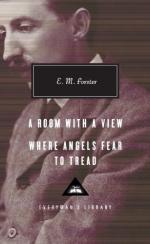She said solemnly, “I wish something would happen to you, my dear friend; I wish something would happen to you.”
“But why?” he asked, smiling. “Prove to me why I don’t do as I am.”
She also smiled, very gravely. She could not prove it. No argument existed. Their discourse, splendid as it had been, resulted in nothing, and their respective opinions and policies were exactly the same when they left the church as when they had entered it.
Harriet was rude at lunch. She called Miss Abbott a turncoat and a coward to her face. Miss Abbott resented neither epithet, feeling that one was justified and the other not unreasonable. She tried to avoid even the suspicion of satire in her replies. But Harriet was sure that she was satirical because she was so calm. She got more and more violent, and Philip at one time feared that she would come to blows.
“Look here!” he cried, with something of the old manner, “it’s too hot for this. We’ve been talking and interviewing each other all the morning, and I have another interview this afternoon. I do stipulate for silence. Let each lady retire to her bedroom with a book.”
“I retire to pack,” said Harriet. “Please remind Signor Carella, Philip, that the baby is to be here by half-past eight this evening.”
“Oh, certainly, Harriet. I shall make a point of reminding him.”
“And order a carriage to take us to the evening train.”
“And please,” said Miss Abbott, “would you order a carriage for me too?”
“You going?” he exclaimed.
“Of course,” she replied, suddenly flushing. “Why not?”
“Why, of course you would be going. Two carriages, then. Two carriages for the evening train.” He looked at his sister hopelessly. “Harriet, whatever are you up to? We shall never be ready.”
“Order my carriage for the evening train,” said Harriet, and departed.
“Well, I suppose I shall. And I shall also have my interview with Signor Carella.”
Miss Abbott gave a little sigh.
“But why should you mind? Do you suppose that I shall have the slightest influence over him?”
“No. But—I can’t repeat all that I said in the church. You ought never to see him again. You ought to bundle Harriet into a carriage, not this evening, but now, and drive her straight away.”
“Perhaps I ought. But it isn’t a very big ‘ought.’ Whatever Harriet and I do the issue is the same. Why, I can see the splendour of it—even the humour. Gino sitting up here on the mountain-top with his cub. We come and ask for it. He welcomes us. We ask for it again. He is equally pleasant. I’m agreeable to spend the whole week bargaining with him. But I know that at the end of it I shall descend empty-handed to the plains. It might be finer of me to make up my mind. But I’m not a fine character. And nothing hangs on it.”




